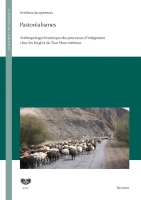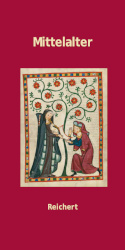Search
Pastoréalismes
Anthropologie historique des processus d’intégration chez les Kirghiz du Tian Shan intérieur
2010
17.0 x 24.0 cm, 296 p., 87 illustrations b/w, hardback
ISBN: 9783895007699
17.0 x 24.0 cm, 296 p., 87 illustrations b/w, hardback
68,00 €
ISBN: 9783895007699
Short Description
The book examines the relations between an economic phenomenon, pastoralism, and a social one, patrilineal descent-reckoning. These relations are described and analyzed on the basis of long-term fieldwork and through the investigation of the existing historical and ethnographic sources. By developing a historical anthropological approach, the book offers a new perspective on pastoralism in a region that has remained largely unexplored up to now. It is of interest for specialists of Central Asia as a cultural area, for anthropologists and historians as well as for all those who are willing to initiate themselves in the past and present of Kyrgyzstan.Description
The book examines the relations between an economic phenomenon, pastoralism, and a social one, patrilineal descent-reckoning. These relations are described and analyzed on the basis of long-term fieldwork and through the investigation of the existing historical and ethnographic sources.The book comprises seven sections: introduction, the past as a reference, integration into the Russian colonial system, Soviet reforms and Soviet herd breeding, dismantling of the Soviet system and conclusions. In the introduction the approach and the methodology of the author are situated within the larger context of anthropological studies of pastoralism and descent. Since contemporary actors often explain and evaluate their present day practices with a reference to a more or less clearly situated “Kyrgyz” past, the second section restores this past on the basis of the existing historical sources and oral traditions in order to allow a better understanding of the reasons for which and the ways in which this past is referred to. Each of the following sections describes and analyzes a particular configuration of the relations between pastoralism and descent and examines the ways these relations are shaped by the varying institutional frames. If integration is predominantly treated in its institutional aspects, the individual actors remain the main source of information. The book thus combines an exhaustive use of the existing historical and ethnographic sources with extensive accounts of individual actors’ memories, their experiences and their conceptions of the past, the present and the future.
By developing a historical anthropological approach, the book offers a new perspective on pastoralism in a region that has remained largely unexplored up to now. It is of interest for specialists of Central Asia as a cultural area, for anthropologists and historians as well as for all those who are willing to initiate themselves in the past and present of Kyrgyzstan.
Reviews
“This monograph examines pastoralist and descent systems in Kyrgyzstan from their integration in the Tsarist colonial system to the present day. Based on extensive archival work as well as over a decade of ethnographic fieldwork in northern Kyrgyzstan, Jacquesson gives a chronological and detailed account of the impact of Tsarist rule, the formation of the Kyrgyz Republic, collectivisation, sedentarisation, the Soviet livestock economy and the dismantling of this system. The argument about the nature, survival and interrelations of pastoralist and genealogical practices is firmly based in debates of both European and Soviet ethnography. The author’s use of the literature is exemplary in bringing together these debates and its comparative dimension.(...) One of the greatest values of this study is the richness of data Jacquesson offers to support her argument: meticulous ethnographic and archival research come together here in a convincing way. As is common with case studies, there sometimes remains the problem of assessing how generalisable the experience of the particular communes whose history she traces is: as she demonstrates, the two often have quite different historical experiences. The reader is given plenty of evidence to compare with the experience of other areas, such as Kazakhstan and Mongolia. While the argument focuses very neatly on examining descent and pastoralist practices, there are also very intriguing discussions on the nature of historical memory and narrative, forms of political leadership, governance and the effect of state policies over several generations. Since the book is in French, its valuable synthesis of and engagement with Russian, French and English scholarship will not be as widely accessible as it deserves. Hopefully a timely translation will allow Central Asian and other interested scholars to join the debate on how kinship, pastoralism and politics have evolved over a century of major changes.”
Jeanne Feaux de la Croix
In: Social Anthropology. 20 (2012) 1. S. 104-106.
Biographical Note
Svetlana JacquessonPlace of birth: Bulgaria
Date of birth: 16th of April 1968
2000: PhD in ethnology from the Institute of Oriental Languages and Civilizations (INALCO) and the School of High Studies in Social Sciences (EHESS) in Paris, France.
2000-2003: post-doctoral fellowship at the French Institute for Central Asian Studies (Tashkent, Uzbekistan)
2006-2009: senior research fellow at the Max Planck Institute of Social Anthropology Halle, Germany.
Svetlana Jacquesson is currently carrying out a Volkswagen-Stiftung project on history and identity in Northern Kyrgyzstan at the Zentrum für Interdisziplinäre Regionalstudien - Vorderer Orient, Afrika, Asien of the Martin-Luther-Universität Halle-Wittenberg in Halle, Germany.
Series Description
No english description available. Showing german description:
Hg. im Auftrag des SFB von Jörg Gertel, Stefan Leder,
Jürgen Paul und Bernhard Streck
Nomadische und sesshafte Lebensformen koexistieren in weiten Teilen der Welt, insbesondere im altweltlichen Trockengürtel, seit mehreren tausend Jahren. Die Erforschung ihrer Interaktion soll in der Reihe Nomaden und Sesshafte dokumentiert werden. Erst seit vergleichsweise wenigen Jahren hat die Einsicht an Geltung gewonnen, dass Nomadismus als Teil übergreifender ökologischer, ökonomischer, politischer und kultureller Systeme in den Blick genommen zu werden verdient, weil Formen des Kontakts mit der Welt der Sesshaften historische Zivilisationen über lange Zeiträume mitgeprägt haben und noch heute, unter anderen Bedingungen, Wirkung entfalten. Austausch und Konflikt zwischen Nomaden und Sesshaften, wie auch Prozesse der Anpassung und Abgrenzung haben sich auf unterschiedliche Lebensbereiche ausgewirkt. Ökonomie und Militärwesen, politische und soziale Ordnungen, Sprache und in Kunst, Vorstellungswelten und Identitätskonstruktionen geben dies zu erkennen. Mit der Wahrnehmung der Vielfalt und Wirkmächtigkeit dieser Interaktion ist eine Forschungsperspektive angelegt, welche die Aufgaben des 2001 einrichteten Sonderforschungsbereichs "Differenz und Integration – Wechselwirkung zwischen nomadischen und sesshaften Lebensformen in Zivilisationen der Alten Welt" bestimmt.
Der interdisziplinäre Rahmen des Sonderforschungsbereichs erlaubt die Beteiligung mehrerer Disziplinen, wie Archäologie und Geschichte, Literaturwissenschaft und Ethnologie, Geographie und Agrarökonomie; ihr Zusammenwirken verspricht Erträge, die eine Vielzahl von Perspektiven und Wissensbereichen erschließen.




 Preface
Preface

 Neuerscheinungen 2023/2024
Neuerscheinungen 2023/2024
 Gesamtverzeichnis 2023/2024
Gesamtverzeichnis 2023/2024
 Katalog Oriental Studies & Linguistics
Katalog Oriental Studies & Linguistics
 Mittelalter
Mittelalter
 Deutsche Inschriften
Deutsche Inschriften
 Musiktherapie
Musiktherapie
 Literaturen im Kontext
Literaturen im Kontext